Chinatown Kid Blu-ray Movie
HomeChinatown Kid Blu-ray Movie 
Arrow | 1977 | 117 min | Not rated | No Release Date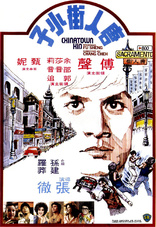
Price
Movie rating
6.5 | / 10 |
Blu-ray rating
| Users | 0.0 | |
| Reviewer | 3.0 | |
| Overall | 3.0 |
Overview
Chinatown Kid (1977)
A martial artist living with his grandfather is stricken with poverty and dreams of a better life. He has to leave Hong Kong after getting into trouble, so he moves to San Francisco, where his superior kung fu leads him back into trouble.
Starring: Sheng Fu, Shirley Yu, Susan Yam-Yam Shaw, Phillip Chung-Fung Kwok, Jenny TsengDirector: Cheh Chang
| Foreign | Uncertain |
| Drama | Uncertain |
| Action | Uncertain |
Specifications
Video
Video codec: MPEG-4 AVC
Video resolution: 1080p
Aspect ratio: 2.37:1
Original aspect ratio: 2.35:1
Audio
Cantonese: DTS-HD Master Audio Mono
English: DTS-HD Master Audio Mono
English on International Version only
Subtitles
English, English SDH
Discs
Blu-ray Disc
Single disc (1 BD)
Playback
Region A (B, C untested)
Review
Rating summary
| Movie | 3.0 | |
| Video | 3.5 | |
| Audio | 3.5 | |
| Extras | 4.0 | |
| Overall | 3.0 |
Chinatown Kid Blu-ray Movie Review
Reviewed by Jeffrey Kauffman December 28, 2021 Note: This film is available on Blu-ray as part of
Shawscope Volume One.
If the Shaw Brothers' logo is intentionally reminiscent of the Warner Brothers' logo, there are a number of other connective tethers between the two
sets of siblings. The Warners founded what would become one of the "Big Five" studios in the American filmmaking industry in 1923, after having
had
some success as exhibitors. They went on to create one of the crown jewels of the "studio system" in the United States, eventually matriculating
pretty forcefully into the television side of things, even when some of their American competitors were not in such a huge rush to "help the enemy".
Somewhat similarly, the Shaw Brothers formed the first version of their moviemaking empire just two years after the Warners, in 1925,
though admittedly it took until 1958 for the organization to be called Shaw Brothers. Like the Warners, the Shaws had begun as venue
owners, though in their case they dealt in both film exhibitions (courtesy of their father) and live theater. Kind of interestingly, given one
of
the Warner's technological triumphs, the introduction of sound with 1929's The Jazz Singer, the Shaws are credited with having brought the "talkie" era to Chinese cinema in 1932 and 1933.
The
Shaws took a while to develop what many think of as their stock in trade, the kung fu films that started appearing in the seventies, but there's little
disagreement that their involvement in that genre massively helped to popularize it, much as the Warners had helped to make the so-called
"gangster
film" must see cinema in the 1930s. Again, understandably somewhat later than the Warners ventured into television in the 1950s, the Shaws
ultimately actually forsook the bulk of their movie output to concentrate on productions for the small screen. But Arrow is concentrating on some of
the studio's feature films from its perceived heyday, with the Volume One of this set's title hinting that fans may be just at the beginning
of
an exciting viewing adventure. As is often the case with these deluxe Arrow releases, the packaging is impressive and the supplemental features
are bountiful and outstanding.
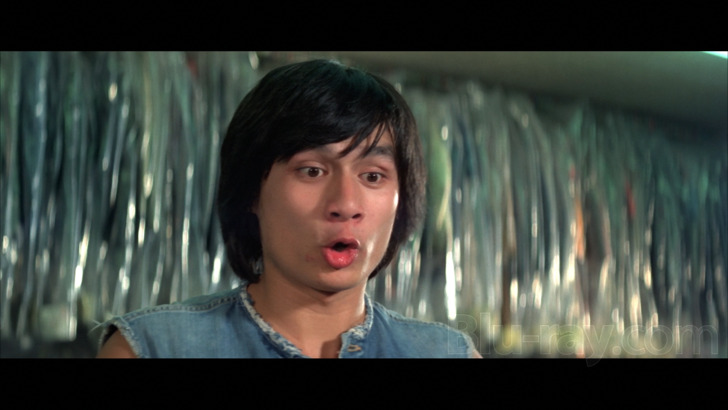
Chinatown Kid is one of the kind of odd outliers in this first set of Shaw Brothers films from Arrow, if only by dint of the fact that it takes place in "contemporary" times (meaning circa the seventies). Tam Tung (Alexander Fun Sheng) has made it out of mainland China to Hong Kong, where he works with his grandfather at an Orange Julius stand. Organized criminal activity enters the fray, and when the heroic Tam realizes he has some inherent martial arts skills, that may have temporarily vanquished the bad guys, but puts Tam in jeopardy, leading to Tam escaping once again, this time (supposedly) to San Francisco (the "liner notes" in Arrow's huge insert booklet detail that the bulk of the film was actually shot on the Shaw Brothers' expansive Clearwater Bay studio).
This is a rather interesting film which combines some of the "gangster" qualities that inform at least some of the edges of other Shaw Brothers properties, but which also offers Sheng as a somewhat morally ambiguous character, one who has absolutely noble qualities (love for his grandfather, loyalty to his friends), but who is also arguably a bit on the mendacious side. In fact, the "dark" materialistic side of the so-called American Dream seems to be getting intentionally skewered throughout the film.
Chinatown Kid Blu-ray Movie, Video Quality 
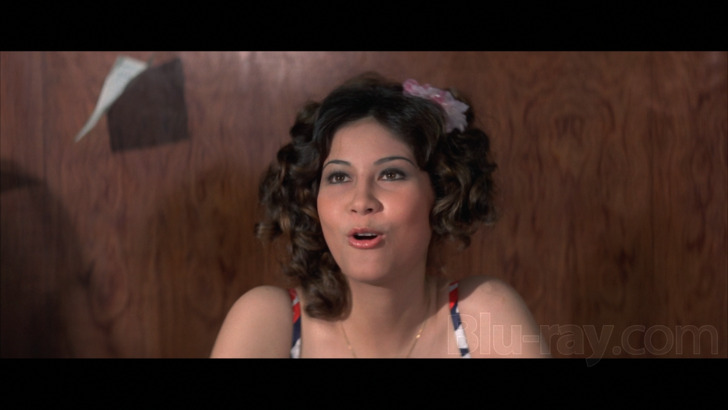
Chinatown Kid is presented on Blu-ray courtesy of Arrow Video with an AVC encoded 1080p transfer in 2.37:1. Arrow's nicely appointed insert pamphlet sized booklet contains quite a bit of information, though all of the films have been lumped together on one page, as follows:
All twelve films in this boxset are presented in their original 2.35:1 aspect ratios [sic] with their original Mandarin, English and Cantonese (where applicable) monoaural soundtracks. Every effort has been made to present these films in their original and complete versions using the best materials available.The fact that so much of the above verbiage is devoted to Chinatown Kid may allude to the fact that the two versions of this film included on this disc have pretty drastically different appearances. Kind of interestingly and perhaps counter-intuitively in that regard, the older Celestial Pictures transfer of the Alternate Version is a much cleaner, better detailed, looking presentation than the newer "restoration" of the International Cut that Arrow has done for this release. To see some of the differences, simply compare screenshots 1 through 15, which are from the shorter Alternate Cut, with screenshots 16 through 19, which come from the International Version, paying special attention to the screenshots where I attempted to capture similar frames. The International Version is much rougher looking, with an almost pixellated grain field and diminished detail levels. There's also quite a bit of damage on display, including some recurrent problems at the edges of the frame. The Alternate Cut may show some of the same high frequency filtering that some of the other Celestial Pictures transfers can display, but to my eyes, it's a much more pleasing viewing experience. The palette is better suffused, and detail levels are noticeably improved. Framing is also just a bit different at times. There's really no damage of any major import in the Alternate Version. International Version much rougher looking than the Alternate Version. Screenshots 16 through 19 are from the International Version.
Five Shaolin Masters, Shaolin Temple, Mighty Peking Man, Executioners from Shaolin, Heroes of the East and the shorter Alternate Version of Chinatown Kid were remastered by Celestial Pictures in 2003-2007, as part of an initiative to digitally restore the entire Shaw Brothers library. The High Definition masters of these restorations, which included the original Mandarin and English mono soundtracks, were supplied to Arrow Films by Celestial Pictures.
King Boxer, The Boxer from Shantung, Challenge of the Masters, The Five Venoms, Crippled Avengers, Dirty Ho and the longer international cut of Chinatown Kid have all been newly restored by Arrow Films in 2021, in collaboration with L'Immagine Ritrovata, Hong Kong Film Archive and Celestial Pictures.
The original 35mm negatives for King Boxer, The Boxer from Shantung, Challenge of the Masters, The Five Venoms, Crippled Avengers and Dirty Ho were scanned at L'Immagine Rittrovata Asia and restored in 2K resolution at L'Immagine Ritrovata, Bologna. The Films were graded at R3Store Studios, London. These restorations have used the entire film negative without resorting to the practice of "frame cutting" resulting in the loss of film frames at each negative splice point.
The mono mixes were remastered from the original sound negatives at L'Immagine Ritrovata. Additional sound remastering was completed by Matthew Jarman/Bad Princess Productions. The audio synch will often appear loose against the picture, due to the fact that the dialogue and sound effects were recorded entirely in post production, as per the production standards of the period.
A 35mm internegative of the International Version of Chinatown Kid was scanned at L'Immagine Ritrovata Asia and restored in 2K resolution at L'Immagine Ritrovata, Bologna. The film was graded at R3Store Studios, London.
The mono mix was remastered from the original sound negative at L'Immagine Ritrovata. Additional sound remastering was completed by Matthew Jarman/Bad Princess Productions.
An additional scene from Chinatown Kid missing from the original elements was scanned from a vintage 35mm print and graded in 2K resolution at American Genre Film Archive (AGFA).
All original materials supplied for these restorations were made available from the Hong Kon Film Archive via Celestial Pictures.
Chinatown Kid Blu-ray Movie, Audio Quality 
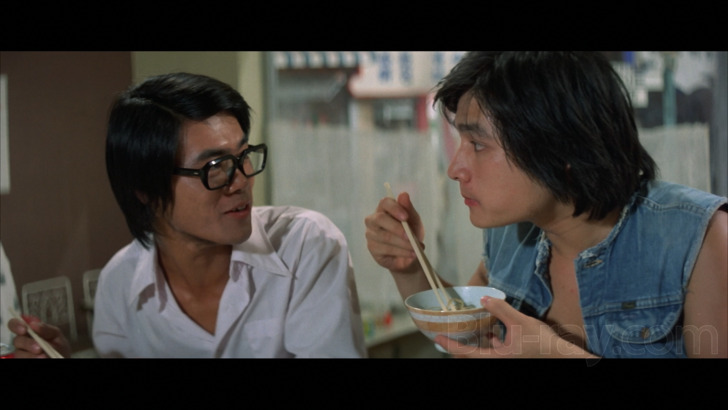
While the disc menu offers DTS-HD Master Audio Mono mixes in Cantonese and English for the International Version, the "liner notes" disclose that the International Version actually offers a "combo platter" of both Cantonese and Mandarin, while the Alternate Version is entirely in Mandarin. In terms of consistency, the Alternate Version's audio is probably the best, though the Cantonese/Mandarin track on the International Version doesn't exhibit any huge problems. The English language track probably fares the worst, with some noticeable distortion including some crackling. All things considered, though, dialogue in all three versions is supported generally well. Optional English subtitles are available.
Chinatown Kid Blu-ray Movie, Special Features and Extras 
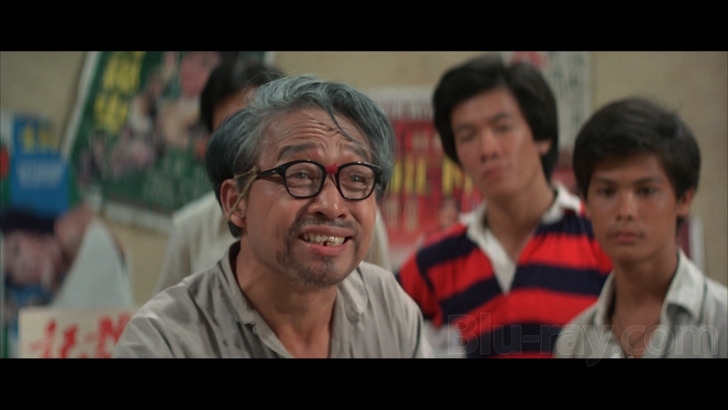
- International Version (1:54:37) and Alternate Version (1:30:14) are offered.
- Commentary by Terrence J. Brady accompanies the Internatoinal Version.
- Interview with Susan Shaw (HD; 23:43) is a 2021 interview conducted by Frédéric Ambroisine, with Shaw discussing the film. She offers what's almost a picture in picture commentary for some scenes. Subtitled in English.
- Elegant Trails: Fu Sheng (HD; 7:21) is a profile of the actor produced by Celestial Pictures in 2005. Subtitled in English.
- Trailer Gallery
- HK Theatrical Trailer (HD; 3:27)
- US Theatrical Trailer (HD; 2:04)
- US TV Spot (HD; 00:32)
- German Theatrical Trailer (HD; 2:36)
- UK VHS Promo (HD; 2:37)
- Digital Reissue Trailer (HD; 1:12)
- Image Gallery
Chinatown Kid Blu-ray Movie, Overall Score and Recommendation 
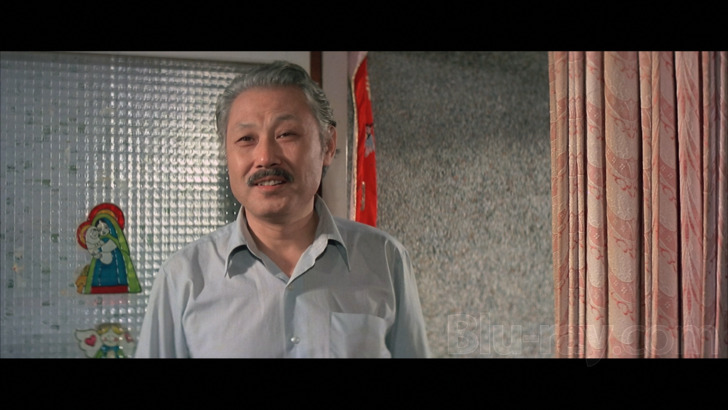
As some of the supporting documentation accompanying this release gets into, there may be better xiaozi (i.e., "brat") films than Chinatown Kid, but the (again, supposed) setting and Fu Sheng's charisma help to elevate this piece, despite some not especially subtle writing. This release may be of special interest to some for the two different versions of the film offered, with technical merits fairly variant between the two. As usual with Arrow's releases, the supplements are outstanding, for those who may be considering making a purchase.
Similar titles
Similar titles you might also like
(Still not reliable for this title)

Challenge of the Masters
Liu A-Cai yu Huang Fei-Hong
1976

The Boxer from Shantung
1972

Executioners from Shaolin
The Executioners of Death / Hong Xi Guan
1977

King Boxer
Five Fingers of Death / Tian xia di yi quan
1972

Crippled Avengers
Return of the 5 Deadly Venoms
1978

Dirty Ho
Lan tou He
1979

The Mighty Peking Man
Goliathon
1977

Five Shaolin Masters
5 Masters of Death
1974

Heroes of the East
1978

Magnificent Ruffians
Mai ming xiao zi / 賣命小子
1979

Shaolin Temple
Shǎo lín sě / 少林寺
1976

Mercenaries from Hong Kong
Lie mo zhe / 獵魔者
1982

Ten Tigers of Kwangtung
Guang Dong shi hu yu hou wu hu / 廣東十虎與後五虎
1979

The Kid with the Golden Arm
Jin bi tong / 金臂童
1979

The Bare-Footed Kid
Chi jiao xiao zi / Chik geuk siu ji / 赤腳小子
1993

The Five Deadly Venoms
The Five Venoms / 五毒 / Wu du
1978

Five Superfighters
Tang shan wu hu / 唐山五虎
1979

Martial Arts of Shaolin
Nan bei Shao Lin / 南北少林
1986

Disciples of the 36th Chamber
Pi li shi jie / 霹靂十傑
1985

Invincible Shaolin
Nan Shao Lin yu bei Shao Lin / 南少林與北少林
1978